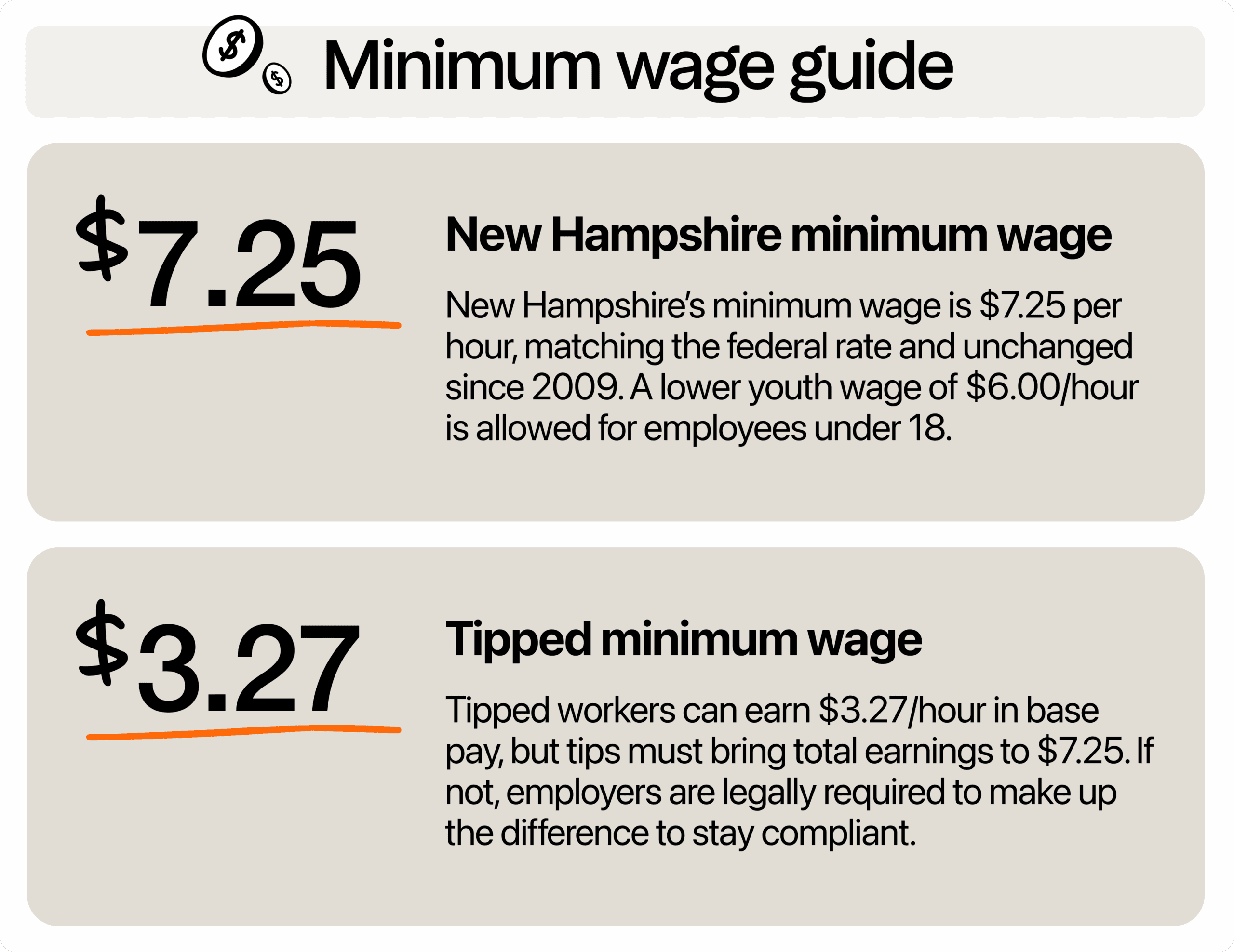Minimum wage is a make-or-break issue for restaurant owners, especially in today’s economy. This is particularly true in New Hampshire, where the minimum wage hasn’t increased in over 15 years. For those trying to hire, retain, and motivate teams in a tight labor market, that’s a real problem.
Let’s explore the minimum wage in NH in 2026, why it has stayed that way since 2009, and whether there are plans to increase it.

What’s the minimum wage in New Hampshire in 2026?
As of 2026, New Hampshire’s minimum wage is $7.25 per hour, the same as the federal minimum. It hasn’t changed since 2009, making it one of the longest-standing wage floors in the country. For tipped workers, like servers and bartenders, the minimum cash wage is $3.27 per hour. That’s 45% of the standard rate.
But here’s the thing: if your team doesn’t earn enough in tips to reach $7.25 an hour, you, the employer, are legally required to cover the gap. So if a server only makes $3.50 in tips one hour, you’ll need to make up the missing $0.48 to stay compliant under the Fair Labor Standards Act (FLSA).
For employees under 18, there’s a legal sub-minimum in place. You’re allowed to pay $6.00 per hour until they turn 18. This youth wage applies only to minors and is one of the few exceptions allowed by state minimum wage laws.
Take note that these wage rates have not kept up with the rising cost of living. In fact, $7.25 in 2009 had about 30% more buying power than it does today.
Meanwhile, the average hourly wage in New Hampshire is $33.08, which is more than four times the minimum. That gap makes it harder for businesses offering only minimum wages to attract and retain skilled restaurant workers.
New Hampshire is also one of the only states in the region that hasn’t raised its state minimum wage above the federal rate. Massachusetts, for example, has raised its minimum to $15 per hour, and Maine’s sits at $15.10.
That puts added pressure on border-area restaurants to offer more competitive pay or risk losing team members to nearby cities. Plus, restaurant owners also have to be familiar with tip pooling laws to stay compliant.
Why is New Hampshire’s wage so low?
New Hampshire’s minimum wage has stayed at $7.25 per hour since 2009, simply because the state never set its own wage law above the federal level. Instead, it defers entirely to the FLSA, which hasn’t raised the federal minimum in over a decade.
This decision reflects a long-standing policy choice, not an oversight. New Hampshire’s lawmakers have repeatedly rejected proposals to raise the minimum wage.
Many cite a pro-business philosophy, arguing that raising wages would hurt small businesses, lead to layoffs, or speed up automation. Some even believe wages should be set by the labor market, not the government.
Low wages also come with long-term costs: higher turnover, weaker morale, and more strain on training. For operators in Nashua, Portsmouth, Keene, and other border towns, this policy gap creates a recruiting problem.
To stay competitive and survive, many restaurants in New Hampshire are choosing to pay above the legal minimum, even if the law doesn’t require it.
What’s a livable salary in NH?
According to the MIT Living Wage Calculator, a single adult with one child would need to earn $44.93 per hour in 2025 just to meet basic living costs in New Hampshire. That includes housing, food, transportation, child care, and healthcare, but nothing extra.
For a two-parent household with one working adult and one child, the livable wage is still around $41.25 per hour. Compare that to $7.25, and you’re looking at more than a 500% difference between minimum wage and a livable income.
Even single adults without dependents face a tough climb. The living wage for a single person in New Hampshire is about $24.78 per hour, still over three times the minimum wage.
These numbers reveal how far current wages lag behind the real cost of living. In cities like Portsmouth, Hanover, and Concord, rent alone can eat up more than half of a full-time minimum wage worker’s paycheck.
A minimum wage earner would have to work a 224-hour week to afford a typical apartment. That’s before groceries, transportation, or health insurance.
Are there plans to raise minimum wages in NH?
Talks about restaurant wage models rising across the U.S. have been going on for quite some time. In New Hampshire, Senate Bill 308 proposed bumping the minimum wage to $12 per hour in 2024 and $15 per hour starting mid-2025. A similar effort, House Bill 726, aimed for a phased increase to $10 per hour in September 2025, reaching $15 per hour by 2028. However, neither reached final approval and now remains stalled.
How do NH’s labor standards compare to neighboring states?
New Hampshire’s minimum wage laws stand out, but not in a good way. Restaurant owners near the state line must compete with higher wages in Massachusetts and Maine or risk losing skilled staff to other New England states.
| State | Minimum Wage | Tipped Wage |
| New Hampshire | $7.25 | $3.27 |
| Massachusetts | $15.00 | $6.75 |
| Maine | $15.10 | $7.55 |
| Vermont | $14.42 | $7.21 |
In Massachusetts, the minimum wage is $15 per hour, with a tipped wage of $6.75, requiring employers to make up any gaps so total earnings reach $15. That’s a full 108% higher base pay than what New Hampshire offers hourly.
Maine adjusts its rates annually and has set a minimum wage of $15.10 per hour in 2026. The tipped wage is $7.55, and employers must ensure total pay is at least $15.10 combined with tips. That’s 108% above NH’s $7.25 floor for tipped roles.
Vermont’s base wage is lower than the first two but still 99% higher than NH’s at $14.42, with a tipped wage at $7.21.
If you’re running a restaurant in Nashua, Portsmouth, or Keene, your hourly team can easily cross state lines to Massachusetts or Vermont for double the pay. Even hiring part-timers for dishwashing or prep becomes harder when nearby businesses can offer twice as much.
The real cost of sticking to the minimum
Paying the legal minimum wage of $7.25 is easy to budget for, but in today’s tight job market, that may be a short-sighted choice for restaurant operators. When entry-level staff cross over state lines for better pay or leave due to burnout, you end up paying the true cost of employee turnover.
Hiring is just the start. Bringing someone new on board means costs for recruiting, interviewing, and onboarding, even before they step behind the station. Recruiting and training an hourly worker can cost as much as $5,864 per person. That number includes productivity losses until the employee is fully up to speed.
And there’s a ripple effect. When employees leave, it hits team morale. Service speed drops, and your best staff end up covering extra shifts. That added stress drives even more turnover, creating a costly cycle.
Over time, these hidden costs (recruitment, training, lost productivity, and coverage) add up faster than a modest raise would. Restaurants with high turnover lose thousands annually, affecting both food quality and customer loyalty.
The bottom line? Offering only the minimum wage can undermine your operation’s stability. Investing in higher pay boosts staff retention and improves service. Ultimately, you’ll save more than it costs at the start.
2026 Labor Costs Playbook
Increase your bottom line with insights from over 500 restaurant pros—learn the true cost of employee turnover, the best way to manage labor costs, and proven strategies to protect profits.

What restaurant owners can do to stay competitive
With New Hampshire’s minimum wage still stuck at $7.25 in 2026, restaurant owners need to take charge and build a competitive pay strategy that works today. This involves not just wages, but also considering benefits like flexible scheduling, performance bonuses, career development opportunities, and workplace culture.
1. Raise base pay voluntarily
Even bumping your base wage by $1 to $2 per hour can help you stand out. By offering slightly higher wages, you show potential hires that you value employee contributions.
John Banquil, Ling & Louie’s Asian Bar and Grill CEO, shared how they find it more important to pay “far above minimum wage for great employees.” “We need to maintain a great culture that ensures people love coming to work every day,” he said.
Aside from base pay, you can offer more competitive benefits, such as flexible hours. In our restaurant employee engagement 2024 report, 62% said they want to be able to balance their work with their personal lives. For NH business owners, you could offer shift-swapping and predictable schedules to attract and retain talent. Using restaurant scheduling software can make the process easier by automating assignments and allowing staff to communicate and trade shifts easily.
2. Benchmark against local competitors
Check what nearby restaurants are paying, especially in border areas where talent can earn $14 to $15 in neighboring states. For instance, if you’re in Nashua, research how much restaurants in Dunstable and Pepperell are offering.
Look at job postings and talk to actual people who are working there. Don’t just compare hourly rates. Take a look at total compensation, including benefits, scheduling flexibility, and career growth opportunities. The goal is to understand the full compensation landscape. Create a spreadsheet tracking wages, perks, and potential for advancement across local restaurants.
Consider non-monetary benefits like training programs and health insurance options. With a holistic approach, you’ll know exactly where you stand in the local job market. It can help you create a job offer where your workforce feels valued and committed to your restaurant’s success.
3. Offer fair, transparent tip pooling
With a tip pool, servers, bartenders, and runners contribute their tips into a shared pot that’s split among eligible employees. This helps smooth out the difference between slow and busy shifts and makes sure everyone contributing to the guest experience gets a piece of the pie.
You can distribute the pool based on hours worked, position, or shift, but always make the rules crystal clear to your team upfront.
Now, here’s the part where many restaurant owners trip up: tip credits. In New Hampshire, you can legally pay tipped employees as little as $3.27 per hour, as long as their tips push their total earnings up to at least the full minimum wage of $7.25/hour. That $3.98 difference is called a tip credit.
But you must track earnings carefully. If an employee doesn’t make enough in tips to hit $7.25 for any shift, you’re legally required to bridge the gap.
Also, if you take a tip credit, you can’t include BOH workers, like dishwashers or line cooks, in the tip pool. Only if you pay all participants at least $7.25 per hour directly can you legally include non-tipped roles in the pool.
Tip pooling and tip credits can be powerful tools, but only when used thoughtfully. The upside is that tip pooling promotes fairness and encourages teamwork. It can also ease tension between high-earning servers and lower-paid support roles.
Tip credits, on the other hand, help control labor costs, especially in tight-margin environments like restaurants. But there are risks. Tip credits can backfire if tips fluctuate too much, leaving you on the hook to make up the difference.
And if you misapply tip pooling rules, like including BOH staff while taking a tip credit, you could end up in violation of federal wage laws. The safest approach is to be transparent, document everything, and never let managers dip into the pool. It’s against federal law.
4. Adjust pricing and menu strategy
If raising wages feels like a stretch, smart pricing and menu planning can help balance your labor costs without hurting your bottom line. Start by reviewing your menu item profitability.
Low-margin items that take a long time to prep or tie up your kitchen may be costing you more than they bring in. Simplifying your menu to focus on high-margin, popular dishes can reduce waste and speed up service. It also lowers labor needs, especially in kitchens stretched thin.
Next, be strategic about price increases. You don’t have to bump every item. You can target just your best-sellers with a modest $0.50 to $1.00 increase to cover higher labor costs without shocking guests.
Communicate clearly on your menus or receipts if needed, especially if you’re adding service charges or automatic gratuities to support a livable wage for your team. Transparency builds trust and helps guests understand they’re supporting fair pay, not just footing a bill.
Lastly, tighten your back-end systems. Trim redundant SKUs, be efficient with vendor orders, and cross-train staff so you can do more with fewer people during slower shifts. These operational tweaks can free up the funds you need to pay above New Hampshire’s minimum wage, which still lags far behind what’s needed to attract reliable talent.
5. Communicate your pay philosophy clearly
Let applicants and staff know: “We pay more because we value our team.” That messaging builds trust and sets expectations. Being open about higher wages and policies, especially in job listings, can reduce hiring time and improve retention by showing you walk your talk.
Is it worth starting a restaurant business in New Hampshire?
One of the biggest advantages of starting a restaurant business in NH is that the state doesn’t tax earned income. This means no personal income tax on wages or salaries.
So, although the minimum wage is relatively low, the lack of state income tax can be a significant financial benefit for restaurant owners and employees alike. There’s also no sales tax, and the state has moderately low business taxes, like a 7.6 % Business Profits Tax and no Business Enterprise Tax for small operations. That means fewer filings and fees for restaurant owners to handle.
Additionally, cities like Portsmouth sit just over an hour from Boston. That means you can tap into a wealthy tourist and commuter market while avoiding the higher business costs inside Massachusetts.
On the other hand, you might think the low minimum wage is an advantage for restaurant owners. However, it actually limits your hiring leverage.
Unless you plan to pay above the minimum, you’ll likely struggle to attract qualified staff, especially compared to neighboring states where wages are double or triple.
The high cost of living in cities like Portsmouth is 31 % more than the national average and 16 % above the state average, with one-bedroom rent averaging $2,336/month in mid-2025. As a result, even full-time entry-level staff working minimum wage may struggle to pay rent, making staff recruitment even tougher.
Given the wage gap and high rents, many employees are drawn to higher-paying markets or other states entirely. That forces restaurants to offer more than $7.25 per hour plus benefits if they want reliable staff, which is an additional cost to the business.
The bottom line
Yes, it can still be worth starting a restaurant in New Hampshire, but only if you’re proactive about compensation and retention. The perks, like no personal income or sales tax and access to affluent consumers, are strong.
But your success hinges on crafting a pay strategy that reflects real living costs. Businesses that pay above minimum, offer solid benefits, and foster team loyalty are the ones that thrive.
Think beyond the minimum
New Hampshire’s minimum wage may still sit at $7.25 an hour in 2026, but you must go beyond that to stay competitive and retain a great staff. Being proactive about compensation strategy can help set you apart and create an environment that attracts top talent.
Make compliance with wage laws easier with 7shifts. Our restaurant payroll software helps you automate wage and tip calculations, making sure you’re always paying your team what they’ve earned.

Rebecca Hebert, Sales Development Representative
Rebecca Hebert
Sales Development Representative
Rebecca Hebert is a former restaurant industry professional with nearly 20 years of hands-on experience leading teams in fast-paced hospitality environments. Rebecca brings that firsthand knowledge to the tech side of the industry, helping restaurants streamline their operations with purpose-built workforce management solutions. As an active contributor to expansion efforts, she’s passionate about empowering restaurateurs with tools that genuinely support their day-to-day operations.
